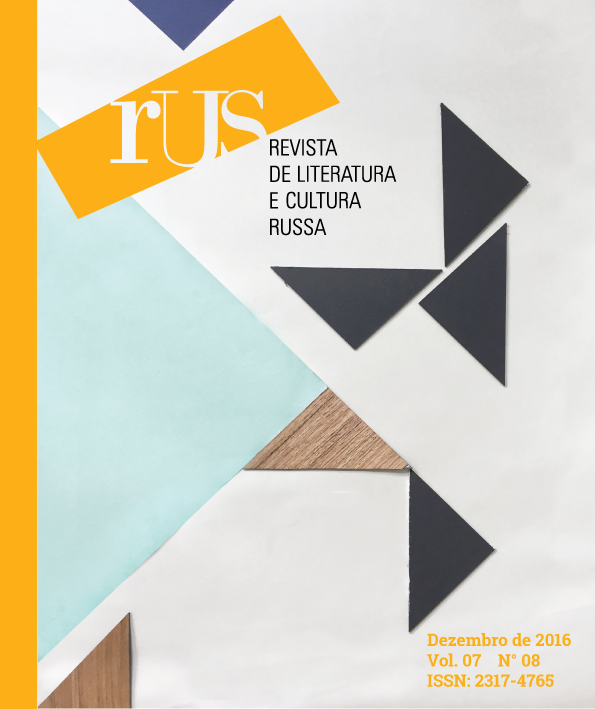O tribunal como rito de passagem em Ressurreição e a literatura como rito de passagem em Tolstói
DOI:
https://doi.org/10.11606/issn.2317-4765.rus.2016.120652Keywords:
Court, Tolstoy, Land, Man, Conflict.Abstract
This paper aims to approach about the land, man and conflict as constitutive categories of Tolstoy’s novel Resurrection. When the aristocrat Nekhliudov confronted in court with his aunts’ former maid he starts a process of self transformation operated by a crisis of conscience triggered by memories of the time in which seduced the girl and abandoned her to her own fate. The changes generate a displacement that is effective both in-and out-wardly, because of the questioning about the conduct and values that shape Russian society as well as the proper conduct of the male character, in parallel to a spatial displacement that crosses the Russian territory in the novel. The land, the man, and the conflict relate dialectically because they relate the character to the physical environment and to the transformations triggered by him. The duality commonly attributed to the human being is perceived in the prince’s presentation who appears in the plot as an averse man, in other words, as an amazing being when he shows up in front of the aristocracy, but also as the needs’ bearer of the socially excluded people.Downloads
References
CALVINO, Ítalo. Seis propostas para o próximo milênio: lições americanas. São Paulo: Companhia das Letras, 1990.
CANDIDO, Antônio. “O homem dos avessos” In: Tese e antítese. São Paulo: Companhia Editora Nacional, 1964.
BOSI, Alfredo. Dialética da colonização. São Paulo: Companhia das Letras, 1992.
FIGUEIREDO, Rubens. “Apresentação” e “Sobre o autor”. In: Ressurreição. São Paulo: Cosac Naify, 2010.
LUKÁCS, Georg. Ensaios sobre Literatura. Rio de Janeiro: Editora Civilização Brasileira, 1968.
SAID, Edward W. Humanismo e crítica democrática. São Paulo: Companhia das Letras, 2007.
TOLSTÓI, L. Ressurreição. Tradução de Ilza das Neves e Heloisa Penteado. São Paulo: Martins Editora, s/d.
Downloads
Published
Issue
Section
License
Copyright (c) 2016 Viviane Michelline Veloso Danese

This work is licensed under a Creative Commons Attribution-NonCommercial-ShareAlike 4.0 International License.
Authors who publish in RUS agree to the following terms:
a. Authors retain copyright and grant the journal right of first publication with the work simultaneously licensed under a Creative Commons Attribution 4.0 International License (CC BY-NC-SA 4.0) that allows others to share the work with an acknowledgement of the work’s authorship and initial publication in this journal.
b. Authors are able to enter into separate, additional contractual arrangements for the non-exclusive distribution of the journal’s published version of the work (e.g., post it to an institutional repository or publish it in a book), with an acknowledgement of its initial publication in this journal.
c. Authors are permitted and encouraged to post their work online (e.g., in institutional repositories or on their website) prior to and during the submission process, as it can lead to productive exchanges, as well as earlier and greater citation of published work (See The Effect of Open Access).





